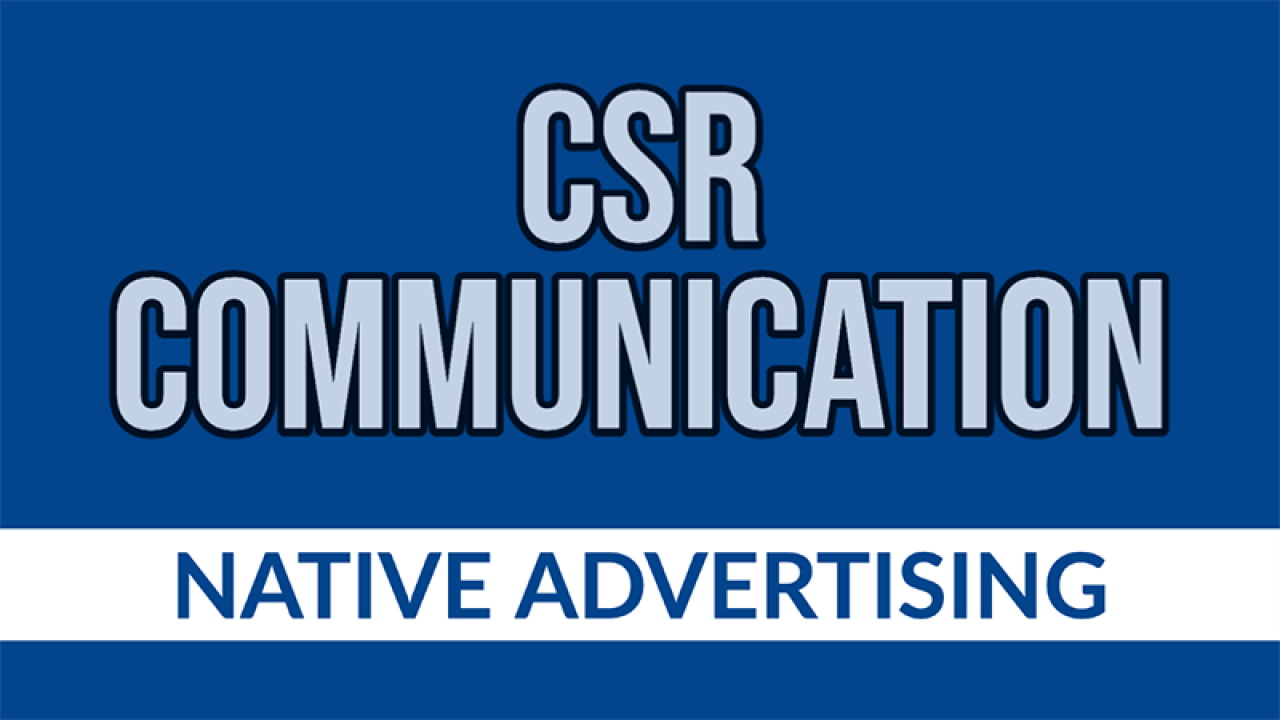January 07, 2022
Native CSR advertising effectiveness depends on persuasion recognition

By Linwan Wu, University of South Carolina and Holly Overton, Penn State University
Are native advertisements effective for communicating a company’s corporate social responsibility efforts as a crisis response strategy? Results from a series of Page Center-funded studies we conducted about native CSR advertising suggest that it depends on whether or not individuals are able to recognize the persuasive intent of the messages they are viewing.
Native advertising imitates the form and appearance of editorial content. It is seamlessly integrated into people’s online newsfeeds and social media posts. It has long been deemed a controversial practice, but some companies are embracing it as an effective way to reach consumers. We wanted to know if the practice can be effective in the context of CSR communication? Is it ethical? And shouldn’t people distrust sponsored content even more than a traditional ad due to its deceptiveness?
We conducted three online experiments to address these questions. Results from this study were published in International Journal of Advertising and Journal of Advertising Research.
Our first study compared individuals’ perceptions of a CSR message when it was presented in three different forms: as a native CSR ad, as a news article and as a company blog post. We found that people who recognized the persuasion purpose of the native CSR ad felt manipulated and therefore attributed low credibility to the CSR communication itself.
Those who were unable to recognize the persuasion purpose attributed high credibility and low manipulativeness, which was consistent with how people who viewed the blog rated it. Interestingly, those who read the CSR message in the form of a news article attributed low credibility and high manipulativeness.
Proceed with caution
While it is possible that a native CSR ad may be more effective than even a news article, native advertising may hurt or completely defeat the purpose of a CSR message’s intent, which is to generate positive attitudes about and behaviors toward a company’s efforts to do good in society. Perceptions of deception could endanger relationships with key stakeholders.
CSR messaging may present an ethical dilemma
CSR messages have the potential to have persuasive impact – whether intentional or unintentional. Because people question CSR messages when they recognize the persuasive intent behind them, CSR communicators need to consider the costs and benefits of distributing CSR messages as paid content.
Our second study examined how advertising recognition influences consumer responses to a native ad about proactive or reactive CSR. We found that when people did not recognize the persuasion purpose of native CSR advertising, they expressed more favorable attitudes toward the ad and stronger intention to share the ad when exposed to a native ad about proactive CSR compared to a native ad about reactive CSR. However, responses were similar for both types of CSR when they did recognize the persuasion purpose.
Content matters
Don’t be too promotional. Native CSR ads can run the risk of being seen as too promotional, manipulative, or even unethical. Developing content that is informational rather than promotional may be crucial for building an effective CSR advertisement. Focus on a call to action that benefits society, not the company.
Our third study investigated native CSR advertising as a post-crisis response strategy. We examined three crisis types (victim, accidental, and intentional). We found that when individuals did not recognize the persuasion purpose of the native CSR ad, they expressed more favorable attitudes toward and greater intention to share the ad in the victim crisis condition compared to the accidental or intentional crisis condition. When participants recognized the persuasion purpose of the native CSR ad, their attitudes toward and intention to share the ad did not differ across three crisis conditions. We offer the following suggestions:
Native CSR ads can work as a response to some (but not all) crises
Companies should refrain from attempting to use a native CSR ad as a crisis response strategy when the company was the victim of a crisis. Surprisingly, we argue that a native CSR ad has a better chance of being effective when companies are facing accidental or intentional crises, as people’s responses don’t vary based on ad recognition.
Native ads may not be the moral compass of public relations
While their effectiveness may vary, it is clear that native CSR ads may have detrimental effects on stakeholders’ perceptions of a company’s transparency, ethicality, and responsibility to the profession.
There is still much to be investigated about native advertising and its role (or lack of) in CSR communications. However, our study findings highlight the need for media education to increase the public’s awareness of native CSR advertising to facilitate informed consumer decisions. Companies should also be aware of the potential benefit and dangers of using native advertising as a platform to communicate about their CSR efforts.
This project was supported by a 2018 Page/Johnson Legacy Scholar Grant from the Arthur W. Page Center.
